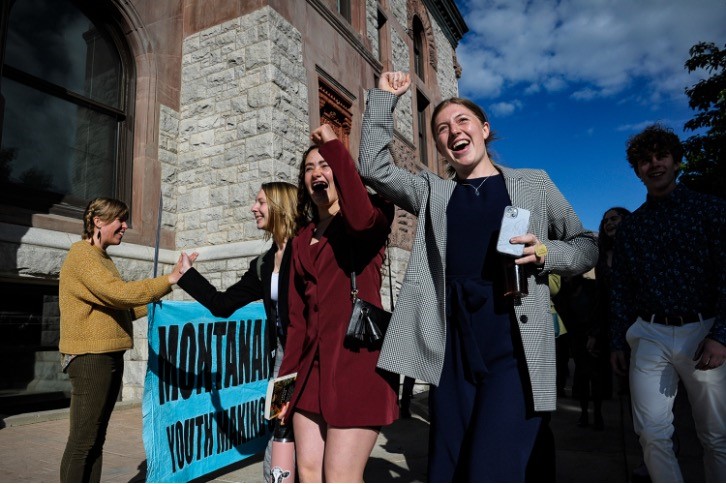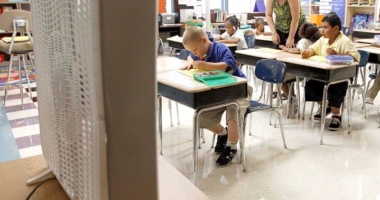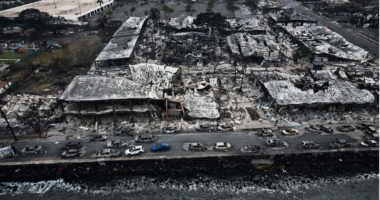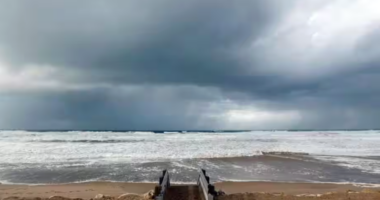Climate, Health and Equity Brief
Young people fight back
August 28, 2023
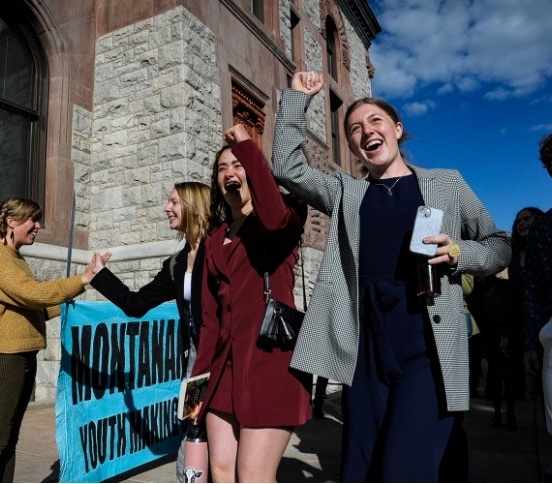
The Climate, Health & Equity Brief is GMMB’s take on the last two weeks’ news on the current impacts of climate change. If you haven’t subscribed yet, you can do so by clicking here.
Hot Topic: Emerging voices. As extreme weather goes into overdrive around the world, young people are emerging on the front lines of climate activism and making their presence known in the courts.
This month, a group of young people aged 5-22 won its first-in-the-nation case against the state of Montana, arguing that the state has failed to uphold the state constitution’s guarantee of a right to a “clean and healthful” environment. The decision affirmed that claim and struck down provisions in the Montana Environmental Policy Act that barred the state from considering climate impacts when permitting energy projects. Despite its certain appeal by the fossil fuel industry, Held v. Montana has been hailed by experts as a major victory and one of the strongest decisions issued by a court to date on climate change.
And a second youth-led lawsuit is now headed to trial next summer. On the heels of the catastrophic climate-fueled devastation on Maui, a judge in Hawaii has approved a lawsuit filed by 14 young people aged 10-20—most of whom are Indigenous youth. The suit claims the state Department of Transportation prioritizes projects like highway construction that “lock in and escalate the use of fossil fuels, rather than projects that mitigate and reduce emissions.”
Unsurprisingly, oil companies like Shell and ExxonMobil, seeing the writing on the wall as youth climate activism gains steam, are partnering with PR firms and social media influencers to gain the trust of younger people, employing greenwashing tactics that further divert attention from the environmental impact of fossil fuels. Let the games begin.
Human Health
Rising global temperatures, exacerbated by climate change and intensified by El Niño, have caused unprecedented heatwaves this summer that are overwhelming emergency rooms with cases of dehydration, heatstroke and burns from hot pavement, worrying public health officials that cities aren’t prepared to handle the heat. (POLITICO)
A new report shows that extreme weather is harming the mental and physical health of Portland, Oregon-area residents, resulting in overwhelming demand but insufficient mental health services available during extreme weather events. (Oregon Public Broadcasting)
More than 90 wildfires started in less than a 24-hour span in Greece due to back-to-back heatwaves, dry conditions, and strong winds, killing 18 people who authorities believe may have been migrants crossing into Greece from Turkey. (The New York Times)
Planetary Health
New research indicates that trees in tropical rainforests lose the ability to photosynthesize if temperatures warm to extremes, threatening the ability of lush tropical rainforests to serve as critical carbon sinks worldwide. (ABC News)
According to a new study in the journal Nature, rapidly vanishing Antarctic sea ice caused catastrophic breeding failure in four out of five emperor penguin colonies in the Bellingshausen Sea in 2022, raising concerns not only for penguins but for the entire Antarctic ecosystem. (CNN)
Hurricane Hilary was the first tropical storm to hit Southern California in 84 years, causing flooding and mudslides and breaking rainfall records across the region and in nearby states Idaho, Montana, Nevada and Oregon. (AP, Los Angeles Times, NBC News)
Equity
According to new research, the wealthiest 10% of U.S. households are the source of 40 percent of nationwide greenhouse gas emissions, and while the bottom 90 percent of households’ share of emissions has fallen, the wealthiest 10 percent’s share has increased. (The Hill)
The devastating wildfires and resulting losses in Maui have raised concerns about “climate gentrification” potentially pricing locals out of safer housing areas, mirroring patterns seen after disasters like Hurricane Katrina in New Orleans and the 2018 Camp Fire in Paradise, California. (AP)
Amid some of the hottest months in history, around 4 million app delivery drivers in the U.S. are enduring extreme heat while working 12- to 14-hour shifts, with most either adapting their routines or enduring adverse health effects as they continue to work in scorching temperatures. (Inside Climate News)
With tribal lands in the U.S. possessing substantial untapped potential for solar and wind energy, a new nonprofit organization is working with Native American tribes to harness that potential in order to rival the impact of gaming as a long-lasting economic engine for tribal communities. (Bloomberg)
Politics & Economy
A judge in Montana ruled in favor of youth plaintiffs who sued the state, claiming that a law barring the consideration of climate impacts when permitting energy projects violates the state constitution’s guarantee of a right to a “clean and healthful environment,” a decision lauded by environmentalists but the fossil fuel industry will appeal. (The Washington Post)
A climate lawsuit brought by 14 Hawaii youths aged 10-20 alleging their constitutional rights have been violated by the state Department of Transportation will go to trial in June 2024, marking the second case in the U.S. to address greenhouse gas emissions from the transportation sector. (Reuters)
In an effort to win the trust of younger generations, oil giants like Shell and ExxonMobil are leveraging TikTok and Instagram stars to reshape their image and promote loyalty programs and low-carbon initiatives, partnering with over 100 influencers since 2017, often with the assistance of PR firms. (Business Insider)
Analysis shows that Chinese officials have discouraged discussion of climate change and its link to the country’s rising emissions, highlighting that there was no major spike in searches for climate change on China’s search engines despite widespread discussion about extreme, deadly weather. (Reuters)
According to a new study, since Elon Musk’s takeover of Twitter (X), nearly half of users who regularly tweeted about climate and biodiversity have become inactive, while misinformation has proliferated. (The Guardian)
Life as We Know It
The fishing industry has sustained Irish families for generations, but the sharp rise in North Atlantic temperatures could lead to white fish migrating further north, thus leaving Irish fishermen with fewer options for catching fresh fish and sustaining their livelihoods. (Euronews)
Action
A new Bank of America report found that the Inflation Reduction Act has led to $132 billion in private investments in 270 new clean energy projects and laid the groundwork for more than 86,000 new jobs. (CNN Business)
As the impacts of climate change intensify, a new generation of young activists is suing their states, taking to TikTok, and organizing marches to demand action from leaders and express their right to a healthier, cleaner planet. (The New York Times)
Ecuadorians cast a historic vote to ban oil drilling in one of the most biodiverse regions of the Amazon rainforest, as scientists warn that deforestation of the Amazon may soon reach a tipping point where it will become inhabitable to millions of species. (Axios)
Kicker
Want to help the teens in your life get involved in climate activism? Check out this resource hub of organizations focused on empowering younger generations to address climate change.
We really need adults to wake up. If we don’t fix this now, there’s not going to be a future.”
– Youth climate activist Kaliko Teruya
The GMMB Climate, Health & Equity Brief would not be possible without the contributions of the larger GMMB team—Thomas Baer, Aaron Benavides, Stefana Hendronetto, Nikki Melamed, Sharde Olabanji and Marci Welford. Feedback on the Brief is welcome and encouraged and should be sent to CHandEBrief@gmmb.com.


